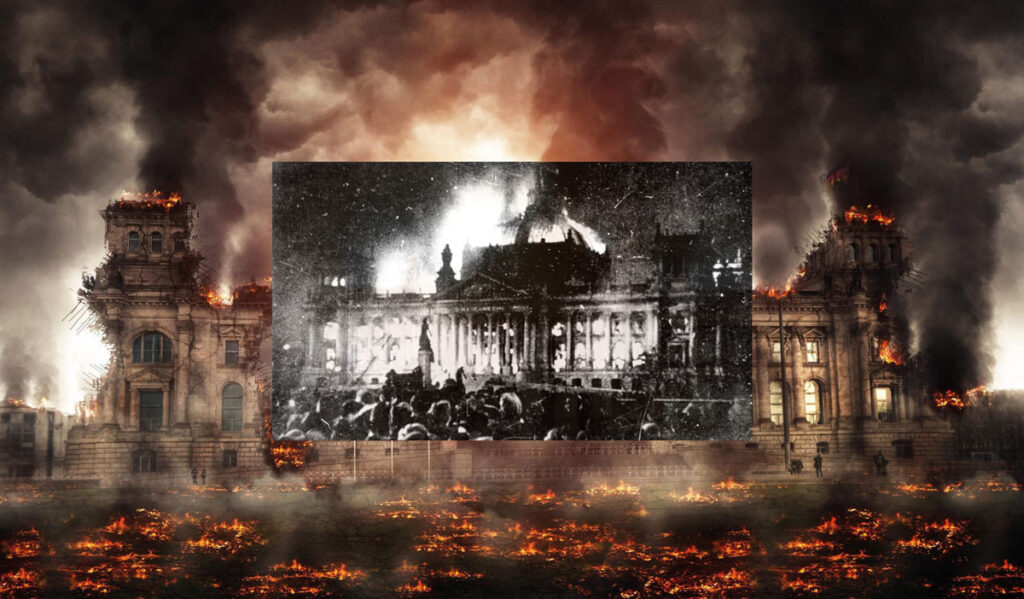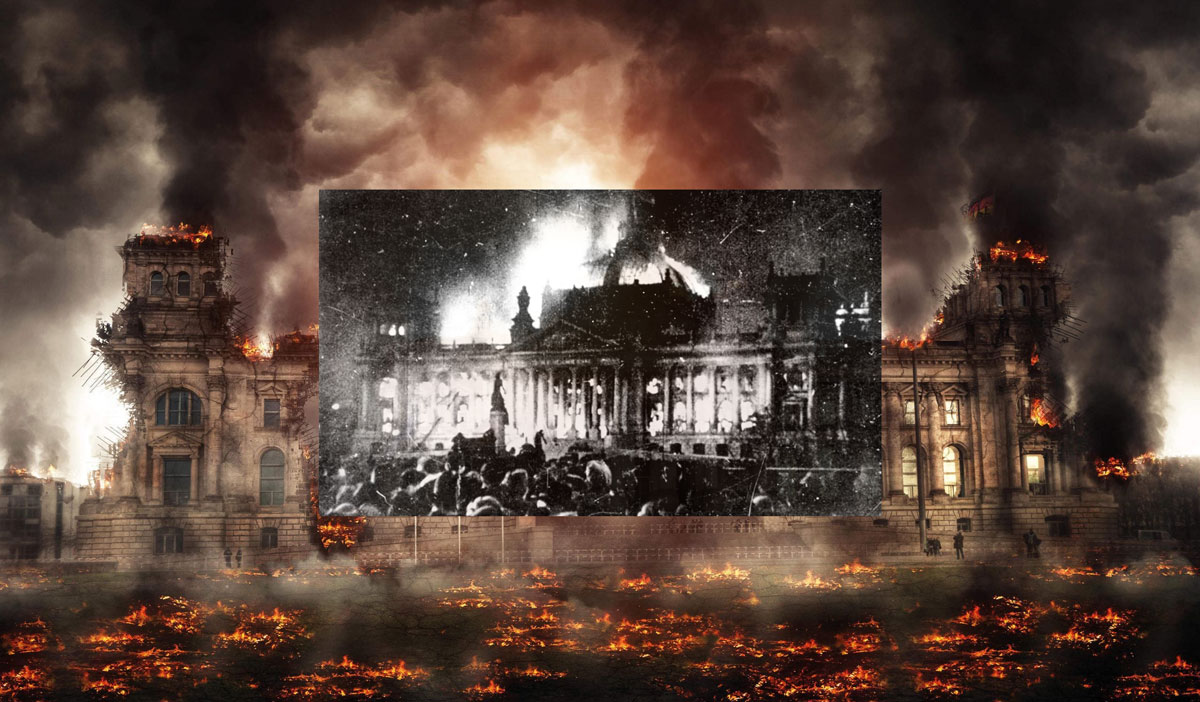
artist’s version of the Reichstag fire, which Hitler blamed on the communists. COLLAGE CREDIT: Lynxotic / DEZAIN UNKIE/ ALAMY
In the past few weeks, U.S. officials have warned several times that Russia plans to create the appearance of an attack on its own forces and broadcast those images to the world. Such a “false flag” operation, they alleged, would give Russia the pretext to invade Ukraine by provoking shock and outrage.
By exposing this plan, the Biden administration sought to undermine its emotional power and stop the Kremlin from manufacturing a casus belli, or justification for war.
But false flag attacks aren’t what they used to be. With satellite photos and live video on the ground shared widely and instantly on the internet – and with journalists and armchair sleuths joining intelligence professionals in analyzing the information – it’s difficult to get away with false flag attacks today. And with the prevalence of disinformation campaigns, manufacturing a justification for war doesn’t require the expense or risk of a false flag – let alone an actual attack.
The long history of false flag attacks
Both false flag attacks and allegations that states engage in them have a long history. The term originated to describe pirates’ wielding of friendly (and false) flags to lure merchant ships close enough to attack. It was later used as a label for any attack – real or simulated – that the instigators inflict against “friendly” forces to incriminate an adversary and create the basis for retaliation.
In the 20th century, there were several prominent episodes involving false flag operations. In 1939, agents from Nazi Germany broadcast anti-German messages from a German radio station near the Polish border. They also murdered several civilians whom they dressed in Polish military uniforms to create a pretext for Germany’s planned invasion of Poland.
That same year, the Soviet Union detonated shells in Soviet territory near the Finnish border and blamed Finland, which it then proceeded to invade.
The U.S. has also been implicated in similar plots. Operation Northwoods was a proposal to kill Americans and blame the attack on Castro, thereby granting the military the pretext to invade Cuba. The Kennedy administration ultimately rejected the plan.
In addition to these actual plots, there have been numerous alleged false flag attacks involving the U.S. government. The sinking of the USS Maine in 1898 and the Gulf of Tonkin incident in 1964 – each of which was a critical part of a casus belli – have been claimed as possible false flag attacks, though the evidence supporting these allegations is weak.
Global visibility, disinformation and cynicism
More recent and even less fact-based is the “9/11 Truth” movement, which alleged that the Bush administration engineered the destruction of the twin towers to justify restrictions on civil liberties and lay the foundation for invading Iraq. Right-wing pundits and politicians have promoted the conspiracy theory that Democrats have staged mass shootings, such as the one at a high school in Parkland, Florida, in 2018, in order to push for gun control laws.
If people believe that false flag operations happen, it is not because they are common. Instead, they gain plausibility from the widespread perception that politicians are unscrupulous and take advantage of crises.
Furthermore, governments operate in relative secrecy and have recourse to tools of coercion such as intelligence, well-trained agents and weapons to implement their agenda. It is not a huge leap to imagine that leaders deliberately cause the high-impact events that they later exploit for political gain, notwithstanding the logistical complexities, large number of people who would have to be involved and moral qualms leaders might have about murdering their own citizens.
For example, it is not controversial to note that the Bush administration used the 9/11 attacks to build support for its invasion of Iraq. Yet this led some people to conclude that, since the Bush administration benefited politically from 9/11, it therefore must have caused the attacks, despite all evidence to the contrary.
The challenge of credibility
The willingness to believe that leaders are capable of such atrocities reflects a broader trend of rising distrust toward governments worldwide, which, incidentally, complicates matters for leaders who intend to carry out false flag attacks. If the impact of such attacks has historically come from their ability to rally citizens around their leader, false flag attacks staged today may not only fail to provoke outrage against the purported aggressor, but they can also backfire by casting suspicion on the leaders who stand to benefit.
Furthermore, investigators using open source intelligence, such as the Bellingcat collective of citizen internet sleuths, make it more difficult for governments to get away with egregious violations of laws and international norms.
Even as the Biden administration attempts to blunt Russia’s ability to seize the initiative, it too faces credibility challenges. Reporters were justifiably skeptical of State Department spokesman Ned Price’s warning about Russia’s false flag plans, especially since he did not provide evidence for the claim.
Skeptics pointed to the August 2021 drone strike during the U.S. withdrawal from Kabul, which the military initially asserted was a “righteous strike” to kill a suicide bomber but that later turned out to be a mistaken attack on an innocent man and his family. It took overwhelming and undeniable evidence from media investigations before the U.S. government admitted the mistake.
Insofar as the Kremlin might expect to benefit from executing a false flag attack, it would be to manufacture a casus belli among Russian citizens rather than to persuade audiences abroad. Surveys have shown that the vast majority of Russians are opposed to invading Ukraine, yet they also harbor negative attitudes toward NATO.
The spectacle of a provocation aimed against Russia on state-run television might provide a jolt of support for an invasion, at least initially. At the same time, Russians are cynical about their own leaders and might harbor the suspicion that a purported attack was manufactured for political gain.
False flag alternatives
In any event, Russia has other options to facilitate an invasion. At the start of its incursion into Crimea in 2014, the Kremlin used “active measures,” including disinformation and deception, to prevent Ukrainian resistance and secure domestic approval. Russia and other post-Soviet states are also prone to claim a “provocation,” which frames any military action as a justified response rather than a first move.
By contrast, false flag operations are complex and perhaps overly theatrical in a way that invites unwanted scrutiny. Governments seeking to sway public opinion face far greater challenges today than they did in the 20th century. False flag attacks are risky, while leaders seeking to manufacture a casus belli can select from a range of subtler and less costly alternatives.
Scott Radnitz, Associate Professor of International Studies, University of Washington
This article is republished from The Conversation by Scott Radnitz, University of Washington under a Creative Commons license. Read the original article.
Related Articles:
- What if “Non-human Biologics” are Watching?
- ‘Most Significant Charges Yet’: Trump Indicted for Trying to Overturn 2020 Election
- But what am I?’ Pee-wee Herman creator and star, Paul Reubens dead at 70
- The Congressional Hearing On UFOs Confirmed the Existence of Aliens? Maybe
- The Earthly Frontier: Building a Sustainable Future at Home
Find books on Music, Movies & Entertainment and many other topics at our sister site: Cherrybooks on Bookshop.org
Lynxotic may receive a small commission based on any purchases made by following links from this page
